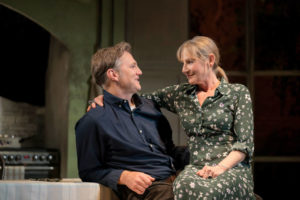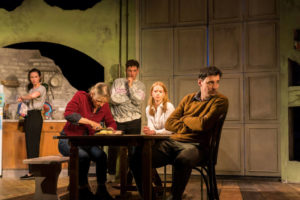Exciting drama from Grime poet Debris Stevenson ★★★★★

Poet in Da Corner is the semi-autobiographical tale of Debris Stevenson and how she was inspired by grime music to become a poet.
Although the word ‘grime’ suggests ‘grim’, in fact it’s not. It’s an uplifting, exhilarating story of an adolescent woman struggling with her dyslexia, her sexuality and her strict Mormon mother. The teenage misfit makes friends with a young grime artist who encourages her to be real in the way grime artists are true to themselves and their background.
I really warmed to these two friends who love and respect each other and who are trying hard in difficult circumstances. Debris Stevenson plays herself and Jammz plays her friend and mentor.
It’s a show full of tempestuous relationships, lyrical language, and a lot of humour. There’s a moment both shocking and funny when her angry but nonviolent mother slowly pours a gallon of milk over her brother.
The title is a reference to the seminal Dizzee Rascal album Boy In Da Corner that was the spark that lit Debris Stevenson’s fire. The play uses an imaginary character SS Viper who represents grime artists and Debris’ best friend at school. He sees her as privileged because she’s white and her mum makes her sandwiches for school lunch. As an adult, he berates her for appropriating grime- and his work in particular- when she’s not from a black disadvantaged background.
But in the course of the play we see how she used grime as a pathway out of her own disadvantages.
Viper takes her to task for leaving the neighbourhood and losing contact with him. She responds: ‘Helped other people cause I couldn’t help you / took responsibility with privilege too. / But I ran away from me when I ran away from you.’ How she develops and whether the rift can be healed is the subject of the play.

The set, designed by Jacob Hughes, is a bare stage that uses minimal furniture. In a Brechtian way, it is made clear the scenes from the past are being acted out for us and the present day adults comment on them. So we don’t get emotionally involved with the characters. But we do care about them and we see the world of disadvantaged working class kids from a sympathetic perspective- not the gangs, aggression and crude misogyny which is the tabloid image of grime.
The talented Stacy Abalogun and Kirubel Belay play the mother, brother and other parts in this exciting evening directed by Ola Ince. The evening ends with the audience dancing as Jammz performs his excellent song Lemonade Man.
I have heard songs by Dizzee Rascal and Stormzy but I couldn’t imagine listening to whole album or going to a concert because my ears find the 140 bpm and the heavy bass difficult. After seeing this show, I now have a new respect for grime and the artists who produce it and I appreciate the quality of the lyrics. There’s a singular quote from Dizzee Rascal that is used in the play: ‘The skies are all empty because the stars are on the ground.’
If you have the opportunity to see Poet In Da Corner as it tours, please do. Even if you think grime (or poetry for that matter) is not for you, do it anyway.
Poet In Da Corner continues at Royal Court Theatre until 22 February 2020 and on tour to The MAC Belfast 26 – 28 Feb, Leicester Curve 6 & 7 March, Birmingham Repertory Theatre 10 – 14 March, Nottingham Playhouse 19 – 21 March, HOME Manchester 24- 28 Mar, Hackney Empire London 31 March – 4 April.




